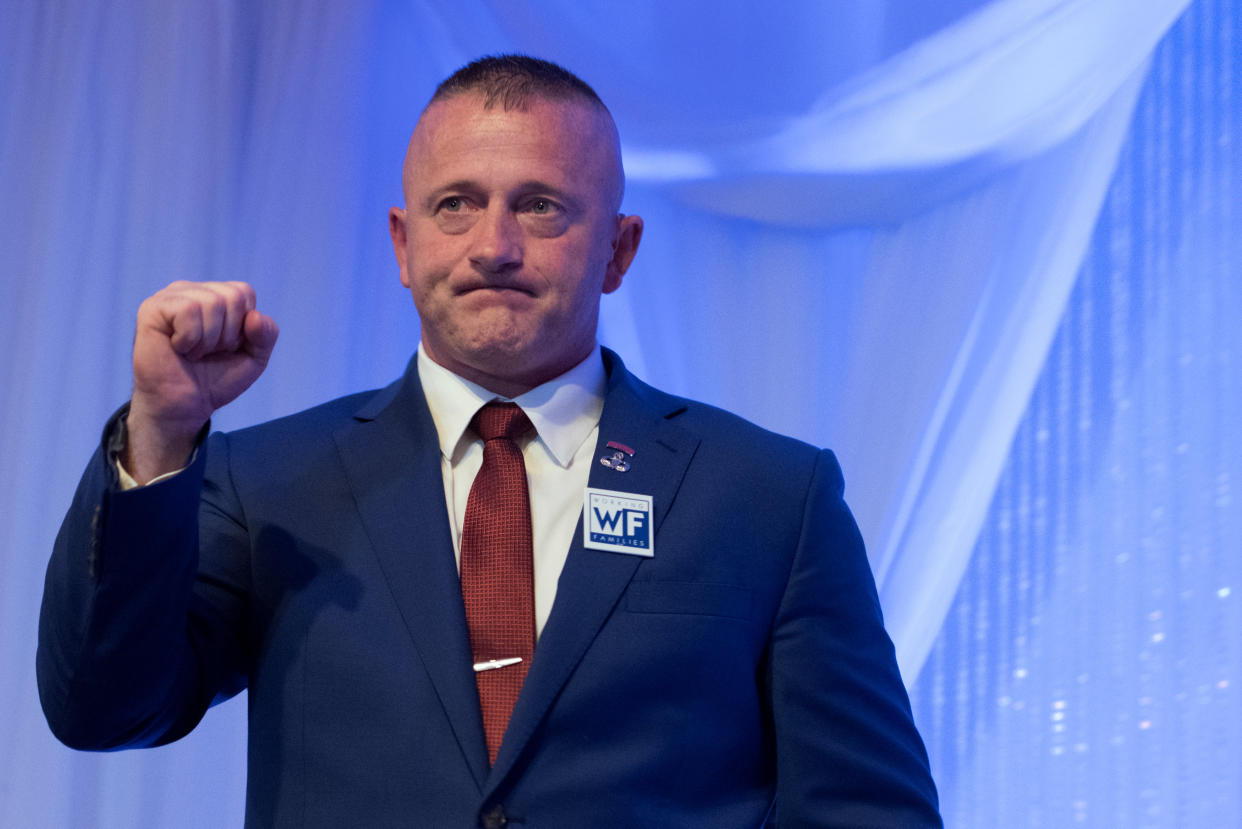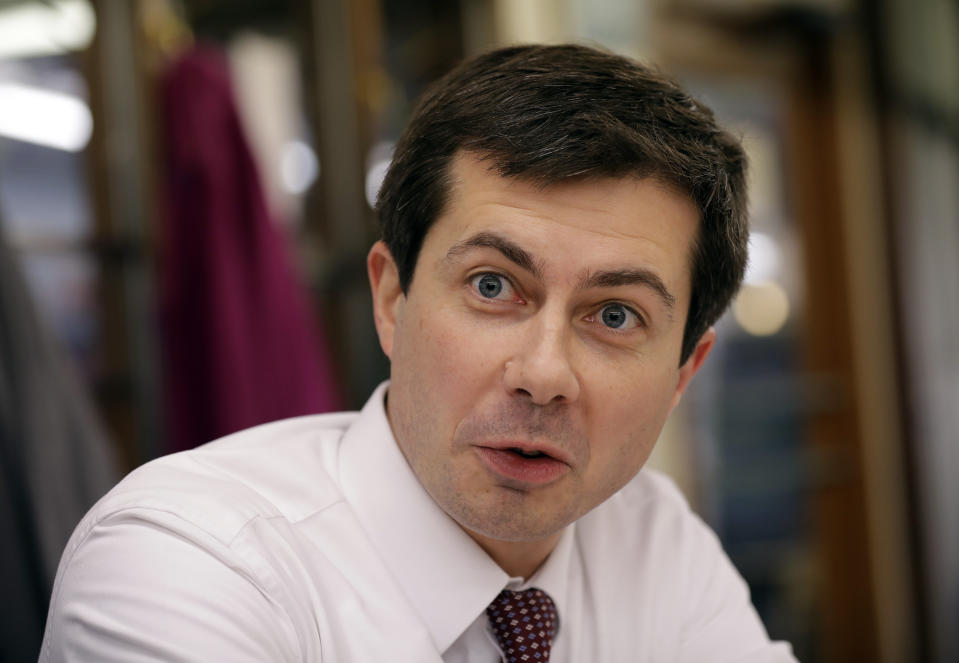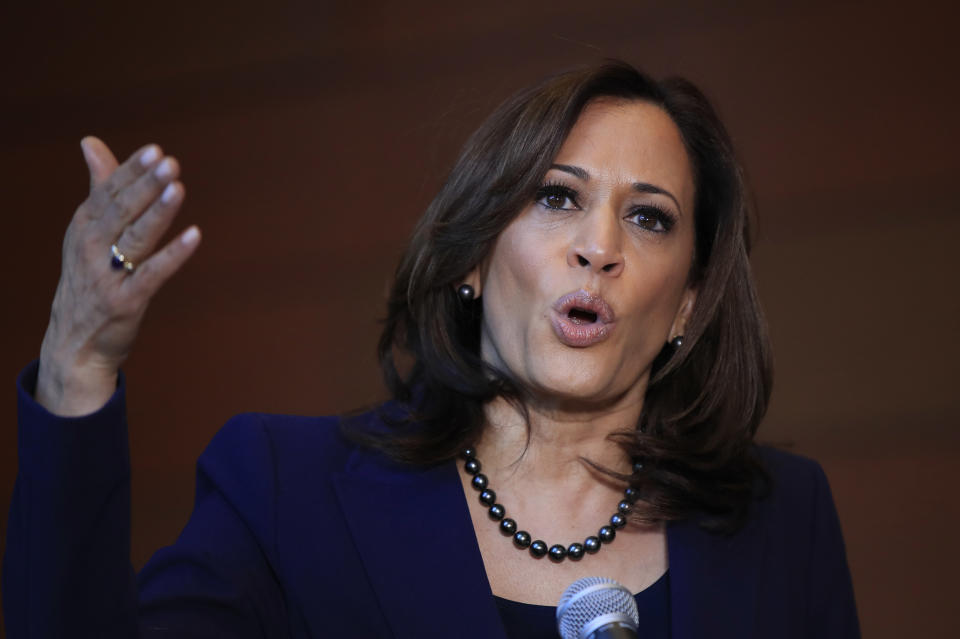2020 Vision: The first dropout, the second mayor, and other milestones

Welcome to 2020 Vision, the new Yahoo News column covering the presidential race. Reminder: There are 376 days until the Iowa caucuses, and 649 days until the 2020 presidential election.
Just in: The first dropout
Richard Ojeda, who left his seat on the West Virginia state Senate to launch a long-shot bid for president just 10 days ago, announced Friday that he is no longer seeking the Democratic nomination.
“I don’t want to see people send money to a campaign that’s probably not going to get off the ground,” Ojeda, a retired U.S. Army major, said in a video statement provided to the Intercept.
Time to update the lineup card …

IN
Elizabeth Warren, Tulsi Gabbard, Julián Castro, Kirsten Gillibrand, John Delaney, Pete Buttigieg, Andrew Yang, President Trump
CONSIDERING (OR BEING CONSIDERED)
Bernie Sanders, Beto O’Rourke, Michael Bloomberg, Kamala Harris, Amy Klobuchar, Cory Booker, Joe Biden, Eric Swalwell, Seth Moulton, Jay Inslee, Sherrod Brown, Mitch Landrieu, Terry McAuliffe, John Hickenlooper, Chris Murphy, Gina Raimondo, Tim Ryan, Joe Kennedy III, Eric Garcetti, Luis Gutierrez, Jeff Merkley, Bill de Blasio, Jeff Flake, John Kasich
OUT
Tom Steyer, Andrew Cuomo, Michael Avenatti, Martin O’Malley, Bob Casey, Richard Ojeda

‘Mayor Pete’ joins the fray
South Bend, Ind., Mayor Pete Buttigieg announced Wednesday that he has launched a presidential exploratory committee because “it is a season for boldness and it is time to focus on the future.”
The 37-year-old, openly gay Democrat is the second mayor to join the race (former San Antonio Mayor Julián Castro announced his candidacy earlier this month). Just three former mayors have ever become president, and all of them held other offices before running for the White House.
Yahoo News’ Alex Nazaryan profiled what’s behind Buttigieg’s unlikely bid:
Buttigieg gets how insane this is. His counterargument is that presidential ambition is fundamentally insane, no more so for the Indiana mayor with a funny name than, say, a U.S. senator from Illinois with an even funnier name and no achievement other than a fairly obvious public stance against invading Iraq. […]
Politics may be the art of the possible, but Buttigieg believes that is too often an excuse for thinking small. So far, he shows no sign of succumbing to that ailment. He wants Washington, D.C., to become a state, which is something that Democrats have long wanted and Republicans have long resisted. Give statehood to Puerto Rico too. And abolish the Electoral College, which favors low-population states. Even more, he argues they are entirely reasonable goals that are pragmatic. Only, he warns, “Pragmatism is not the same thing as incrementalism.”
“We shouldn’t filter all of our proposals through whether they can be plausible tomorrow,” Buttigieg says. “If we do, we’re always gonna be doing piecemeal, incremental stuff.”
“It’s clear that this president, at this point, cannot be helped.”
— Former New York City Mayor Michael Bloomberg, who is mulling a White House bid, during a speech at a Democratic business conference in Virginia on Friday
Is Inslee in?
Washington Gov. Jay Inslee was in New Hampshire this week testing the waters for a campaign focused on climate change.
There is a growing belief that climate change could be a winning issue for Democrats in 2020, and Inslee wants to be at the front of the fray.
“We know we have to essentially decarbonize our economy,” Inslee told students at Saint Anselm College’s New Hampshire Institute of Politics on Tuesday.
As a campaign slogan, “decarbonize our economy” strikes a wonkish note that might appeal to millennials, although it doesn’t exactly lend itself to a rally chant.
He continued: “We know we have to stop being slaves to the oil and gas industry.”
That’s more like it.
The apology primary
One of the first themes to emerge from the race for the Democratic nomination is the importance of knowing when to apologize — and that is early, sometimes even before you’ve formally announced your bid for president.
CNN compiled a great sizzle reel of the Democratic hopefuls (Bernie Sanders, Joe Biden, Tulsi Gabbard, Kirsten Gillibrand et al.) apologizing for past comments, actions or positions in an effort to get out ahead of issues that could haunt them later.
”Some of the biggest names are offering the biggest apologies…they’re trying to amend some of their positions on their previous votes on immigration, criminal justice reform and health care,” @jeffzeleny reports on Democrats opening their 2020 presidential bids with apologies. pic.twitter.com/3xIHHMcYcC
— The Situation Room (@CNNSitRoom) January 22, 2019
“I read in the New York Times today that one of my problems is that if I ever run for president I like Republicans. OK, well, bless me, Father, for I have sinned.”
— Former Vice President Joe Biden during a speech at the U.S. Conference of Mayors in Washington, D.C., on Thursday
Kasich’s choice
Among the handful of Republicans who might challenge President Trump, former Ohio Gov. John Kasich remains the most likely to mount such a bid.
Yahoo News’ Matt Bai, who recently interviewed Kasich, says the choice, if he does decide to make another run against Trump, is this: “Do you try to take out the incumbent president in the primaries and win back the party, or do you make an independent bid instead?”
If you’re Kasich or some other serious Republican who’s had enough, which way do you go at Trump? … If you’re inherently a party guy, and you still believe that Reagan’s Republican Party exists and hasn’t been permanently overrun by the forces of Trumpism, then it’s probably worth a primary fight. [B]ut if your goal is to actually win the White House, party be damned, then I’d say an independent campaign is the wave of the future, and more likely to get you there.
Warren’s ‘wealth tax’
As firebrand newcomers like Rep. Alexandrea Ocasio-Cortez, D-N.Y., try to pull the Democratic Party to the left on taxes, they are bringing some leading presidential candidates with them. Sen. Elizabeth Warren, D-Mass., unveiled a novel tax plan this week that would for the first time impose an annual federal tax on wealth, not just income.
Warren, who announced her exploratory bid on New Year’s Eve, announced her plan on Twitter Thursday.
It would make the ultra-rich pay their fair share & generate nearly $3 trillion over the next 10 years. A lot of rich and powerful people won’t like it – but I don’t work for them. Sign our petition if you agree: It’s time to tax the wealth of the top 0.1% https://t.co/3L5jbCCQ6x
— Elizabeth Warren (@ewarren) January 24, 2019
Her proposal would tax all assets above $50 million, including real estate, at 2 percent a year, rising to 3 percent over $1 billion. At that level, it would raise over $3 billion a year from Jeff Bezos alone.
Ocasio-Cortez floated her proposal for raising the maximum marginal income tax rate to 70 percent, which would apply to income above $10 million. In an interview with CBS’ “60 Minutes” that aired earlier this month, she said she would use the receipts to pay for the so-called Green New Deal, a program to move the country toward zero carbon emissions.
The marginal rate has been even higher in the past, but Ocasio-Cortez was the first to use the term “tippy-top” to describe those who would be affected by such a plan.
“People are going to have to start paying their fair share in taxes,” she said. “You look at our tax rates back in the ’60s and when you have a progressive tax rate system, your tax rate, you know, let’s say, from zero to $75,000, maybe 10 percent or 15 percent, etc. But once you get to, like, the tippy-tops — on your 10-millionth dollar — sometimes you see tax rates as high as 60 or 70 percent.”
John Maynard Keynes had no comment.

Dems’ ‘Rocky Mountain divide’
If Sen. Kamala Harris, D-Calif., or Rep. Tulsi Gabbard, D-Hawaii, wins the Democratic nomination, either would be the party’s first presidential nominee from a state west of the Rocky Mountains in its 191-year history.
But they are likely not to be the only Western Democrats vying to break the so-called “Rocky Mountain” hex. Washington Gov. Jay Inslee, Sen. Jeff Merkley, D-Ore., Rep. Eric Swalwell, D-Calif., and Los Angeles Mayor Eric Garcetti are all said to be considering bids. Former Colorado Gov. John Hickenlooper and Montana Gov. Steve Bullock get partial credit for being from states that actually straddle the Rockies.
Why so many this cycle? “In recent election cycles, the Democratic Party has established a noticeable foothold in the West — creating a strong regional bench,” Dr. Eric Ostermeier writes in his “Smart Politics” column. “Democrats currently hold eight of the 13 Western governorships (61.5 percent), 15 of 26 U.S. Senate seats (57.7 percent), and an impressive 75 of 102 U.S. House seats (73.5 percent).”
According to Ostermeier, the closest Democrats ever came to putting forth a Western presidential nominee were politicians from Plains states: William Jennings Bryan (Nebraska, 1896, 1900, 1908) and George McGovern (South Dakota, 1972) and Lyndon B. Johnson (Texas, 1964). Only Johnson won. “Definitely west of the Mississippi,” Ostermeier notes. “But not the West.”
Maddow’s prediction
For what it’s worth, MSNBC’s Rachel Maddow told Harris that “there’s a good chance you’ll win the nomination.”
First town hall
The first nationally televised town hall meeting of the 2020 presidential cycle, featuring Harris and hosted by CNN’s Jake Tapper, will air live from Drake University in Des Moines on Monday at 10 p.m. ET/9 p.m. CT.
Who else is going to Iowa?
Sen. Sherrod Brown, D-Ohio, on Jan. 31.

Des Moines
• Friday, Jan. 25, Snow showers, 16°/-5°
• Saturday, Jan. 26, Snow showers, 20°/9°
• Sunday, Jan. 27, Cloudy, 18°/16°
Manchester, N.H.
• Friday, Jan. 25, Cloudy, 36°/17°
• Saturday, Jan. 26, Partly cloudy, 29°/18°
• Sunday, Jan. 27, Partly cloudy, 42°/23°
Source: Weather Underground
Longreads: Ted Kennedy, Jimmy Carter and a lesson from history for President Trump
___
Read more from Yahoo News:




